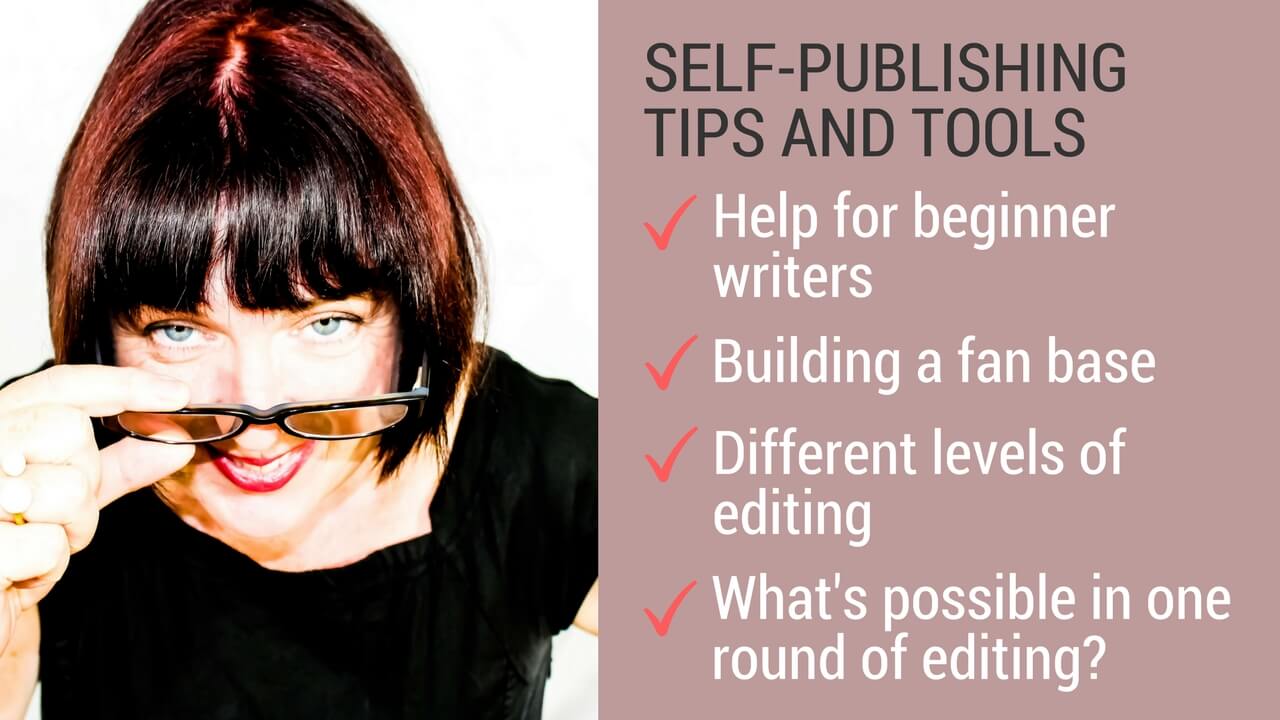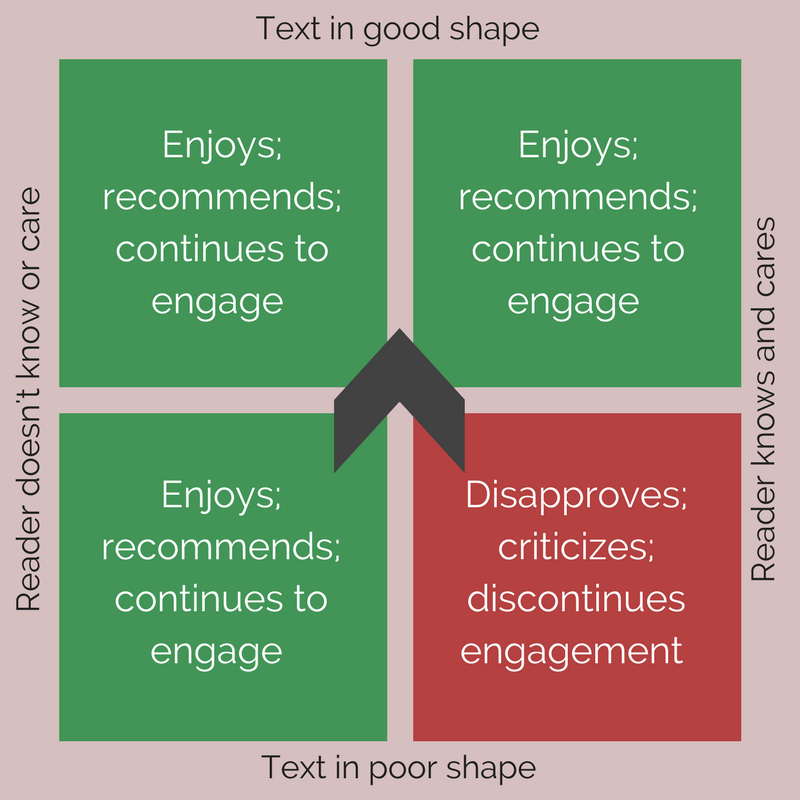|
If you're unsure about why proofreading, copyediting, line editing and structural editing are different, and how you might allocate your self-publishing budget, here's some guidance ...
Polishing your text and building fans
Readers who've enjoyed your book are more likely to leave positive reviews and come back for more. Readers who've been frustrated with aspects of your book are more likely to leave negative reviews and reject further opportunities to engage. One way of thinking about these groups of readers is in terms of zones. The happy readers are in the green zone, the grumpy ones in the red. Thinking in terms of these zones can help writers to decide which editorial services to commission, when and why. Readers have different expectations and levels of knowledge. If there are problems with the text, some won't realize. Or they will realize but won’t care. Others will care very much and be frustrated by the lack of polish.
Copyright Louise Harnby | Proofreader 2017
It's about putting your readers front of mind because they're your fans, the people who'll rave about you and tell everyone to buy your book. Fans hang out in the green zone.
Let’s assume for simplicity that the readership is split evenly between those who don’t know or care that there are problems in the book and those who do know and care. Who’d want to alienate 50% of their readership? If you’re self-publishing, you’ll want to stay out of the red zone. That means getting your book in the best shape you can before you publish. Mimicking the mainstream publishing industry What you need to do to stay out of the red zone will depend on whether you’re a mature, developing or emerging writer and the degree to which you've mastered your self-editing skills.
These are the stages, broadly speaking, that the mainstream publishing industry takes its books through to keep its authors in the green zone. In reality, the production process varies from press to press, but it gives you an idea of the traditional approach. It’s not just publishing-house processes that vary. The terminology that independent editors use to define their levels of service provision differs widely too. For example, my pre-publication proofreading service is called Proofreading Standard. My copyediting service falls under the rubric of Proofreading Plus (and I include line editing when required). It’s therefore advisable to discuss what you want and what the editor can offer before the editing starts. The table below gives you a broad idea of the different stages (S1, S2 etc.) of professional editing and what they include. As you can see, I’ve allowed for a fair degree of overlap.
Artistry versus wizardry
Gandalf isn’t an editor or a proofreader; he’s a wizard! If he did my job, he’d be able to carry out all of the editorial stages above and find every single niggle, error and inconsistency in just one pass. That’s because he has magical powers – unlike publishers and independent editors!
In the real world, though, you’ll have a budget, and some of you will have to make difficult decisions about which services to commission and which to omit (or how you're going to save up for everything your book needs).
It’s not for me to tell you here where to invest your budget – universally applicable advice is impossible given the number of factors to consider. What I can tell you is that I've never been able to undertake a final proofread for a book that hasn’t been copyedited first. Proofreading is the stage where 90% of the sentence- and word-level problems (and 100% of the big-picture work) should have been fixed – it’s a final level of quality control. Furthermore, I've never finished a copyedit and told the author, 'That's it. It's perfect!' In a nutshell, good to go is unlikely to be where you’re at if you hire an editorial professional for just one pass. Good enough will have to suffice. I'm not being grouchy, just honest about what's possible. I'm a genuine advocate of the independent author's right to write and publish. I think it's brilliant that anyone can put their storytelling out there. My young daughter was publishing her own stories on WattPad before she was celebrating a birthday with double digits! How marvellous is that? As long as you understand what's achievable, that's fine with me! Guidance on making the tough decisions
That's it for this week. I hope you've found the advice here useful. Enjoy the green zone!
Louise Harnby is a fiction copyeditor and proofreader. She curates The Proofreader's Parlour and is the author of several books on business planning and marketing for editors and proofreaders.
Visit her business website at Louise Harnby | Proofreader & Copyeditor, say hello on Twitter at @LouiseHarnby, or connect via Facebook and LinkedIn. If you're an author, you might like to visit Louise’s Writing Library to access my latest self-publishing resources, all of which are free and available instantly.
6 Comments
28/4/2017 08:39:30 pm
This is beautifully written and illustrated, Louise. I wish every author would read this, and I've just shared it on LI.
Reply
Louise Harnby
28/4/2017 09:30:39 pm
Thank you so much, Carol! It's a difficult ride for many indie authors at the start of their journey, isn't it? The more we can do to help them, the easier that journey will be. I'm trying to write more articles on the basics for beginners to help them make the tough decisions. Thanks for helping spread the word!
Reply
28/4/2017 10:04:11 pm
You're very welcome. Don't forget to let them know about the importance of an index, while you're at it.
Louise Harnby
28/4/2017 11:42:15 pm
Are you an indexer, Carol?
Reply
8/5/2017 09:26:17 am
Thanks for sharing these information with us. Great blog.
Reply
Louise Harnby
8/5/2017 06:50:04 pm
You're very welcome, Lily!
Reply
Your comment will be posted after it is approved.
Leave a Reply. |
BLOG ALERTSIf you'd like me to email you when a new blog post is available, sign up for blog alerts!
TESTIMONIALSDare Rogers'Louise uses her expertise to hone a story until it's razor sharp, while still allowing the author’s voice to remain dominant.'Jeff Carson'I wholeheartedly recommend her services ... Just don’t hire her when I need her.'J B Turner'Sincere thanks for a beautiful and elegant piece of work. First class.'Ayshe Gemedzhy'What makes her stand out and shine is her ability to immerse herself in your story.'Salt Publishing'A million thanks – your mark-up is perfect, as always.'CATEGORIES
All
ARCHIVES
July 2024
|
|
|
|


















 RSS Feed
RSS Feed





